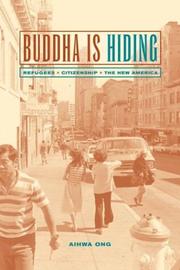| Listing 1 - 2 of 2 |
Sort by
|

ISBN: 159734513X 9786612762925 0520937163 1282762923 9780520937161 1417522798 9781417522798 0520229983 9780520229983 0520238249 9780520238244 9781597345132 6612762926 9781282762923 Year: 2003 Publisher: Berkeley University of California Press
Abstract | Keywords | Export | Availability | Bookmark
 Loading...
Loading...Choose an application
- Reference Manager
- EndNote
- RefWorks (Direct export to RefWorks)
Fleeing the murderous Pol Pot regime, Cambodian refugees arrive in America as at once the victims and the heroes of America's misadventures in Southeast Asia; and their encounters with American citizenship are contradictory as well. Service providers, bureaucrats, and employers exhort them to be self-reliant, individualistic, and free, even as the system and the culture constrain them within terms of ethnicity, race, and class. Buddha Is Hiding tells the story of Cambodian Americans experiencing American citizenship from the bottom-up. Based on extensive fieldwork in Oakland and San Francisco, the study puts a human face on how American institutions-of health, welfare, law, police, church, and industry-affect minority citizens as they negotiate American culture and re-interpret the American dream. In her earlier book, Flexible Citizenship, anthropologist Aihwa Ong wrote of elite Asians shuttling across the Pacific. This parallel study tells the very different story of "the other Asians" whose route takes them from refugee camps to California's inner-city and high-tech enclaves. In Buddha Is Hiding we see these refugees becoming new citizen-subjects through a dual process of being-made and self-making, balancing religious salvation and entrepreneurial values as they endure and undermine, absorb and deflect conflicting lessons about welfare, work, medicine, gender, parenting, and mass culture. Trying to hold on to the values of family and home culture, Cambodian Americans nonetheless often feel that "Buddha is hiding." Tracing the entangled paths of poor and rich Asians in the American nation, Ong raises new questions about the form and meaning of citizenship in an era of globalization.
Cambodian Americans --- Refugees --- Citizenship --- Birthright citizenship --- Citizenship (International law) --- National citizenship --- Nationality (Citizenship) --- Political science --- Public law --- Allegiance --- Civics --- Domicile --- Political rights --- Displaced persons --- Persons --- Aliens --- Deportees --- Exiles --- Cambodians --- Ethnology --- Social conditions. --- Ethnic identity. --- Civil rights --- Social aspects --- Law and legislation --- Oakland (Calif.) --- City of Oakland (Calif.) --- Ethnic relations. --- Américains d'origine cambodgienne --- Réfugiés --- Social conditions --- Ethnic identity --- Conditions sociales --- Identité ethnique --- Family. --- Cambodians. --- Adaptation. --- Refugees. --- Américains d'origine cambodgienne --- Réfugiés --- Citoyenneté --- Droits --- Conditions sociales. --- Identité collective. --- american citizenship. --- american culture. --- american dream. --- american institutions. --- anthropology. --- asia scholars. --- buddhism. --- buddhists. --- california. --- cambodian americans. --- cambodian refugees. --- citizenship experience. --- cultural anthropologists. --- demographic studies. --- ethnic tensions. --- fieldwork. --- globalization. --- minority citizens. --- modern history. --- new america. --- nonfiction study. --- oakland. --- pol pot regime. --- race and class. --- regional history. --- san francisco. --- social sciences. --- southeast asia. --- textbooks. --- welfare. --- Citoyenneté --- Identité collective.

ISBN: 1598750151 0520936655 128276277X 9786612762772 9780520936652 0585466041 9780585466040 9780520227873 0520227875 9780520235434 0520235436 9781598750157 9781282762770 6612762772 0520227875 0520235436 Year: 2003 Publisher: Berkeley University of California Press
Abstract | Keywords | Export | Availability | Bookmark
 Loading...
Loading...Choose an application
- Reference Manager
- EndNote
- RefWorks (Direct export to RefWorks)
Chicago's Southwest Side is one of the last remaining footholds for the city's white working class, a little-studied and little-understood segment of the American population. This book paints a nuanced and complex portrait of the firefighters, police officers, stay-at-home mothers, and office workers living in the stable working-class community known as Beltway. Building on the classic Chicago School of urban studies and incorporating new perspectives from cultural geography and sociology, Maria Kefalas considers the significance of home, community, and nation for Beltway residents.
Social values --- Sociology, Urban --- Working class --- Values --- Urban sociology --- Cities and towns --- Commons (Social order) --- Labor and laboring classes --- Laboring class --- Labouring class --- Working classes --- Social classes --- Labor --- Employment --- Beltway (Chicago, Ill.) --- Chicago (Ill.) --- Chikago (Ill.) --- Chikaho (Ill.) --- City of Chicago (Ill.) --- Shiḳago (Ill.) --- Čikago (Ill.) --- شيكاغو (Ill.) --- Shīkāghū (Ill.) --- Çikaqo (Ill.) --- Чыкага (Ill.) --- Chykaha (Ill.) --- Чикаго (Ill.) --- Shikááʼgóó (Ill.) --- Σικάγο (Ill.) --- Sikago (Ill.) --- Kikako (Ill.) --- שיקגו (Ill.) --- Sicagum (Ill.) --- Chicagia (Ill.) --- Chiagum (Ill.) --- Čikāga (Ill.) --- シカゴ (Ill.) --- شکاگو (Ill.) --- Shikāgū (Ill.) --- Kyekago (Ill.) --- Tchicago (Ill.) --- שיקאגא (Ill.) --- Čėkaga (Ill.) --- 芝加哥 (Ill.) --- Zhijiage (Ill.) --- Race relations. --- Social conditions. --- Working class - Illinois - Chicago. --- Sociology, Urban - Illinois - Chicago. --- Social values - Illinois - Chicago. --- america. --- american history. --- anthropologists. --- anthropology. --- beltway. --- chicago school. --- chicago. --- community. --- cultural geography. --- cultural historians. --- cultural perspective. --- demographic studies. --- ethnographers. --- firefighters. --- home. --- local history. --- neighborhood. --- office workers. --- police officers. --- regional history. --- sociologists. --- sociology. --- southwest side chicago. --- stay at home mothers. --- urban studies. --- white working class. --- working class community. --- working class.
| Listing 1 - 2 of 2 |
Sort by
|

 Search
Search Feedback
Feedback About UniCat
About UniCat  Help
Help News
News